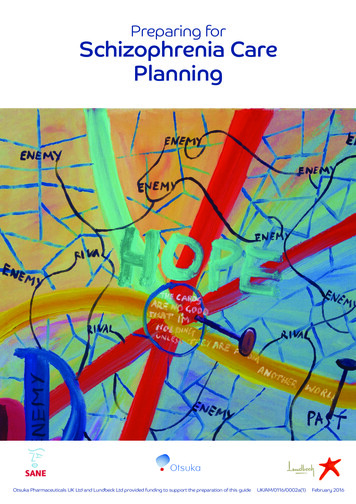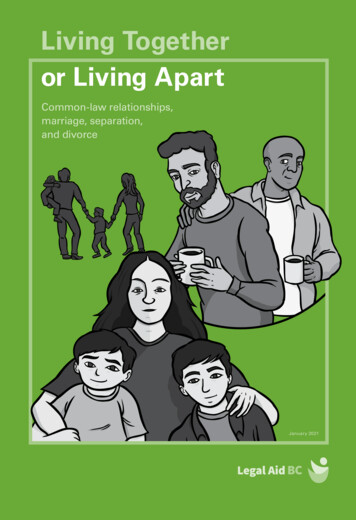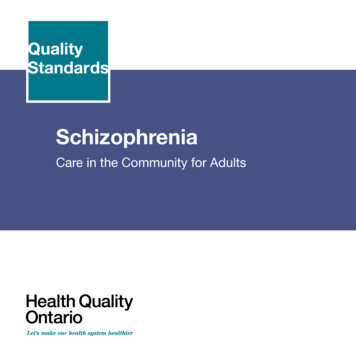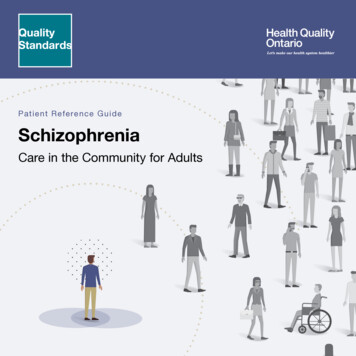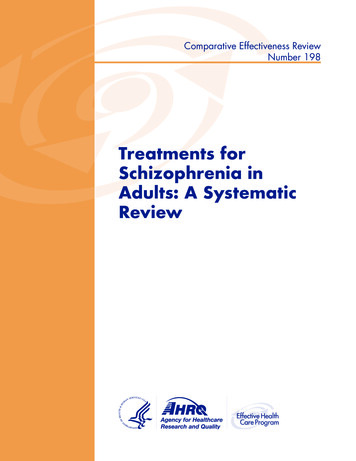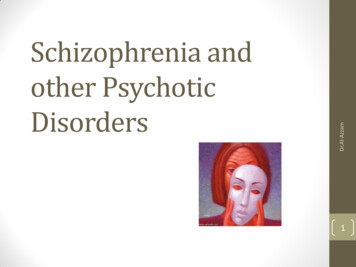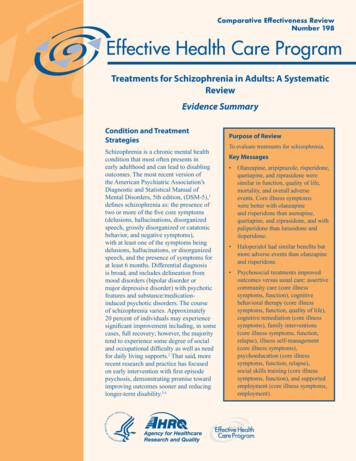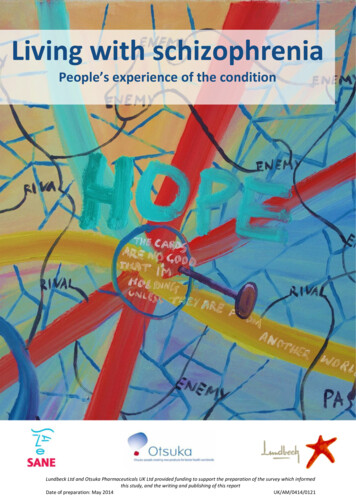
Transcription
Living with schizophreniaPeople’s experience of the conditionALundbeck Ltd and Otsuka Pharmaceuticals UK Ltd provided funding to support the preparation of the survey which informedthis study, and the writing and publishing of this reportDate of preparation: May 2014UK/AM/0414/0121
About schizophreniaSchizophrenia is a severe mental illness that causes a range of different symptoms and changes in behaviour1.It is a relatively common condition with around one in 100 people developing it in their lifetime2. The cause isunknown but it is thought to result from a combination of genetic and environmental factors3.Schizophrenia can occur at any age, although the condition typically starts in early adulthood4 and is most oftendiagnosed between the ages of 15 and 355. The symptoms are usually described as either positive or negative: Positive symptoms represent a change in behaviour or thoughts (for instance hallucinations or delusions)Negative symptoms represent a withdrawal or lack of function that you would expect to see in a healthyperson (for example a lack of emotion or appearing apathetic)6The course of the condition can vary considerably from person to person, with some people experiencingpositive symptoms very briefly while others may have them for many years7.During acute episodes, the person’s experience and thought processes become distorted, which can lead tothem feeling intense panic, anger or depression. Following resolution of the acute episode, usually aftertreatment, symptoms diminish and often disappear for many people, although sometimes a number ofnegative symptoms may remain.The Government’s mental health strategy, No health without mental health, highlighted that people withserious mental illness have significantly worse health outcomes than the rest of the population, and called forthis to be addressed as a priority8. People with schizophrenia and psychosis have an average life expectancy ofaround 15 to 20 years less than the general population9.Schizophrenia can have an economic impact both on those affected by the condition and on the nationaleconomy. A UK study estimated that the annual cost to UK society attributable to schizophrenia is 11.8 billiona year ( 60,000 per individual with schizophrenia)10. Of this, the cost to the public sector is estimated to be 7.2 billion ( 36,000 per individual with schizophrenia) a year11.Furthermore, many relatives and other unpaid carers of people with schizophrenia will give up employment ortake time off work in order to provide care and support. It is estimated that 4.8% of carers of people withschizophrenia had terminated employment and 15.5% took an average of 12.5 days off work per yearspecifically as a result of being a carer12.The condition also has a significant economic impact on NHS services. Relapse is a major driver of costs, mainlydue to hospitalisation. A study in the UK found costs for relapsed patients were, over a six month period, fourtimes higher than for non-relapsed patients ( 8,218 compared with 1,899)13. Each day a person with a mentalillness spends in an acute hospital is estimated to cost the NHS 295, with this figure rising to 585 per day inan intensive care unit14. For those that are admitted through A&E there is an additional cost of 13115. Giventhat nearly a third (32.2%) of NHS psychiatric bed days in England in 2010/11 were for people diagnosed withschizophrenia and related disorders, the costs to the NHS are significant16.Cover image by the late Bryan Charnley from his series of paintings and self-portraits in which he depictshow alienated a person can feel when struggling with the symptoms of schizophrenia. He reaches for hopein a world which is perceived as hostile and isolating.Lundbeck Ltd and Otsuka Pharmaceuticals UK Ltd provided funding to support the preparation of the survey which informedthis study, and the writing and publishing of this reportDate of preparation: May 2014UK/AM/0414/01212
ContentsOverview. 4Recommendations . 5Introduction . 6Methodology . 6Diagnosis. 7Information and support. 11Care and treatment . 16Impact of schizophrenia . 24Making schizophrenia care count . 27Annex A: Information about respondents . 28References . 31Lundbeck Ltd and Otsuka Pharmaceuticals UK Ltd provided funding to support the preparation of the survey which informedthis study, and the writing and publishing of this reportDate of preparation: May 2014UK/AM/0414/01213
OverviewSchizophrenia is a serious mental illness that has a significant impact on people affected by it. Thecondition is also still associated with considerable stigma, fear and limited public understanding. Itcan have a major impact on family members and carers. As well as the human cost, substantialfinancial costs can result from a diagnosis of schizophrenia, for the NHS and wider society.In order to inform what the priorities should be for schizophrenia care in the UK, SANE, inpartnership with Lundbeck and Otsuka, asked patients and carers for their views on the care andsupport they have received.Responses to our survey indicate that people with schizophrenia, their family and carers are stillexperiencing problems with the care and support they receive. For example: People are not being given enough information about their condition, with over half ofrespondents (58%, n 30) diagnosed with schizophrenia stating that they received noinformation at all at diagnosis The large majority of people with schizophrenia reported that they felt only partly involvedor completely uninvolved (86%, n 41) in their choice of treatment. Furthermore, only one infour family members/carers (25%, n 12) stated that they were always involved in thetreatment choice of the person they cared for We have also identified problems with access to treatment and with the support given.Nearly two-thirds (63%, n 29) of patients stated that there were delays in receivingpsychological therapies and just over half (51%, n 49) of the people with schizophrenia,their family members and carers stated that they were dissatisfied with the supportprovided by doctors in monitoring physical healthTackling these problems, as well as the other issues identified in this report, should enable peoplewith schizophrenia to say: When I first had problems I was seen quickly and by the right peopleI am supported to learn about schizophrenia and I how it might affect meI am supported to choose the right treatment and care for myselfI am supported to understand the importance of taking my medication properlyMy family and carers are helped to support me and feel supported themselvesMy treatment is reviewed regularly in a meaningful wayMy physical health needs are given equal importance to my mental healthI feel that every contact with healthcare professionals is meaningfulLundbeck Ltd and Otsuka Pharmaceuticals UK Ltd provided funding to support the preparation of the survey which informedthis study, and the writing and publishing of this reportDate of preparation: May 2014UK/AM/0414/01214
Recommendationsabout patient organisations, and otherrelevant support organisationsDiagnosis Healthcare professionals should makeevery contact count to ensure that theearly signs of schizophrenia are identifiedand people receive a timely and accuratediagnosis. This is particularly important foryoung people who first experiencepsychosisServices that are likely to come intocontact with people experiencing earlysigns of schizophrenia should have policiesin place to ensure that people are referredto appropriate mental health services toreduce the number of people whosediagnosis is arrived at in in-patient settingsCare and treatment Avoiding relapse should be seen as animportant outcome of effective treatmentand the person’s family and carers shouldbe supported to help prevent avoidablereadmissions to hospital Healthcare professionals should offermore frequent reviews of treatment andsupport, and involve the patient, theirfamily and carers in reviewing care plans NHS decision-makers should ensure thatthere is sufficient provision of a range ofpsychological therapies for people withschizophrenia so that people do notexperience delays in accessing thesetreatments People with schizophrenia and theirfamilies and carers should be involved ininforming service design so that provisionreflects their needs NHS decision-makers and providers ofservices need to focus on ensuring peoplehave an ongoing positive experience ofcare People with schizophrenia should havetheir physical health monitored regularlyand treated effectivelyInformation and support People affected by schizophrenia shouldbe provided with timely, accurate, andhigh quality information about thecondition, the different treatment optionsavailable and potential side-effects ofmedicationsHealthcare professionals should supportpeople with schizophrenia to adopt themost effective treatment regime for themand ensure they can make informeddecisions about their treatmentChoice of medication should be made bythe patient and healthcare professionaltogether, taking into account the views offamily and carers if the person withschizophrenia agrees. This should be ameaningful ongoing discussion amongst allinvolved in the care planning processbased on trust, familiarity and continuityof careHealthcare professionals should routinelyinform people affected by schizophreniaImpact of schizophrenia Schizophrenia impacts on the quality of lifeof the individual, their family and carers,therefore policymakers and NHS providersshould focus on reducing the economicand social consequences of the conditionLundbeck Ltd and Otsuka Pharmaceuticals UK Ltd provided funding to support the preparation of the survey which informedthis study, and the writing and publishing of this reportDate of preparation: May 2014UK/AM/0414/01215
IntroductionTo help improve the support for those affected by schizophrenia SANE partnered with Lundbeck andOtsuka to carry out a survey to explore how people are affected by the condition and what theirexperiences are of care and treatment.The findings point to a number of measures that we believe need to be taken to ensure that peoplewith schizophrenia, as well as those caring for them, are able to access high quality services that willhelp to improve their quality of life.The aim of the report is to help clinicians, NHS managers and policymakers to be more aware of theimpact of the condition on people’s lives and the steps they can take to make the experience of careand treatment a positive one.MethodologyBetween September and November 2013, an online survey was conducted to find out more aboutthe impact of schizophrenia on people with the condition and their family and carers.Respondents were filtered into two categories, one for people with a schizophrenia diagnosis, andthe other for carers and/or family members of people with schizophrenia. The two groups ofrespondents were directed to two targeted sets of questions. Each respondent was subsequentlyasked to answer a number of questions unique to the category in which they had been placed.People with schizophrenia were asked 31 questions on different aspects of their condition andexperience. Carers and family members were asked 20 questions on their experiences and how thecondition had affected both themselves and their family member/the individual they cared for.People were asked to provide answers to a number of open, closed and multiple choice questionsbased on the following themes, around their experience of care and treatment: DiagnosisChoiceInformationQuality of life TreatmentConcordance with medicationRelapseA total of 121 people completed the survey and all completed responses were included in the analysisin this report. Among the total number of respondents, 56 specified that they had a diagnosis ofschizophrenia, while 62 indicated that they were family members/carers of people with schizophrenia.Statistics are presented both as percentages and numbers. Please note that the percentages usedthroughout the report have been calculated based on the total number of people that responded tothe given question.More information about respondents can be seen in Annex A.Lundbeck Ltd and Otsuka Pharmaceuticals UK Ltd provided funding to support the preparation of the survey which informedthis study, and the writing and publishing of this reportDate of preparation: May 2014UK/AM/0414/01216
DiagnosisOur survey sought to gain a deeper understanding of people’s experience of the process of diagnosis,assessing their earliest experiences of symptoms, whether they had experienced delays in receiving adiagnosis, and the impact diagnosis had on their life.What did the survey tell us?As highlighted earlier, the survey was split into two sections, one for people with a schizophreniadiagnosis, and the other for carers or family members of people with schizophrenia. As shown inFigure 1 below, nearly two-thirds of respondents (65%, n 34) first experienced signs of
In order to inform what the priorities should be for schizophrenia care in the UK, SANE, in partnership with Lundbeck and Otsuka, asked patients and carers for their views on the care and support they have received. Responses to our survey indicate that people with schizophrenia, their family and carers are still experiencing problems with the care and support they receive. For example: People .
